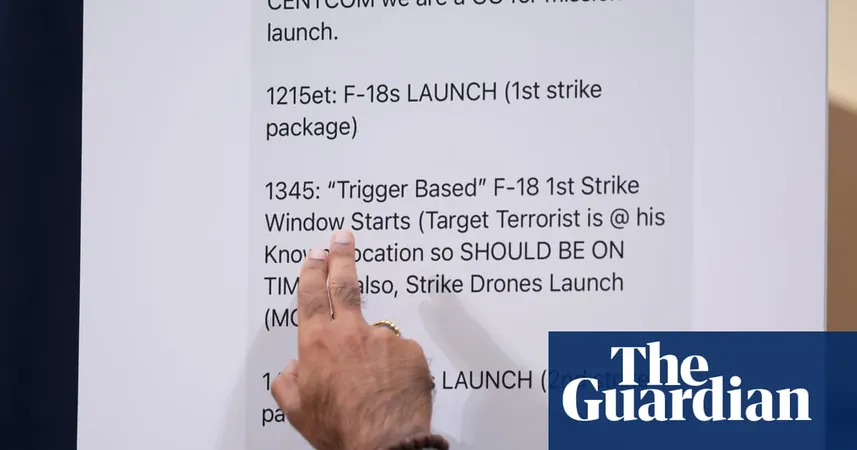
Alarming Signal Leak Puts Five Eyes Security at Risk, Warns Former Canadian Spy Chief
2025-03-27
Author: William
Alarming Signal Leak Puts Five Eyes Security at Risk, Warns Former Canadian Spy Chief
In a shocking revelation, Canada’s former intelligence chief, Richard Fadden, has raised concerns about the recent leak of sensitive military plans from the Trump administration, warning that it poses a significant threat to international intelligence-sharing agreements, particularly among the Five Eyes allies—Canada, the United States, the United Kingdom, Australia, and New Zealand.
On Wednesday, the Atlantic magazine published explicit details from a group chat, which included classified plans for US bombings and drone attacks. The breach was particularly troubling as it involved a prominent journalist who was mistakenly added to the conversation, exposing strategic military discussions that could compromise operations and situational awareness in sensitive areas.
"This is very worrying," Fadden stated, highlighting that Canada must assess the implications of such leaks on its national security. "Is the United States prepared to protect our secrets, as we are bound to protect theirs?" The situation raises serious questions about the reliability of American handling of confidential information, especially since this leak originated from the upper echelons of the US government.
The Five Eyes alliance has long stood as a cornerstone of intelligence sharing between the allied nations, but Fadden fears that this incident could foster distrust within the group. "Every country has experienced leaks, but the problem here is the lack of accountability," he lamented. "The current US administration doesn't appear to recognize this leak as a serious issue."
Despite the weight of the leak's details, key figures including Pentagon chief Pete Hegseth have dismissed the severity of the incident, claiming none of the transmitted information was classified. The White House press secretary labeled the story as an exaggeration from "a Trump-hater," dismissing claims of 'war plans' entirely. "No locations. No sources & methods. NO WAR PLANS," emphasized National Security Adviser Mike Waltz on social media, attempting to reassure investors and allies alike.
However, Fadden finds these responses troubling. "It would be constructive if someone in the administration could admit a mistake and express a commitment to maintaining critical intelligence relationships," he noted. Failure to do so only exacerbates the tension, which has been palpable amid an already strained US-Canada relationship.
Furthermore, the use of Signal, a popular encrypted messaging app among journalists, has come under scrutiny. While it offers secure communication, the app’s prohibition on federal devices raises concerns about the potential for further security breaches, especially when officials rely on personal phones for sensitive discussions. "Even with strong encryption, private devices can be vulnerable," Fadden cautioned.
As Canada navigates a tumultuous terrain with its largest trading partner and closest military ally, Prime Minister Mark Carney voiced the necessity for Canadians to become increasingly self-reliant in light of deteriorating relations. He emphasized the need to prepare for the worst-case scenario regarding national security.
Fadden’s analysis indicates that while the alliance may survive this crisis, it will likely spark intense reflection and adjustment among the Five Eyes nations regarding classified information sharing. "We need to be more judicious on what we deem ‘Canadian eyes only’ intelligence, which could lead to a more guarded approach overall," he explained.
The ramifications of this leak could very well prompt a reevaluation of trust and communication methods among key allies, underscoring the critical importance of information security within the framework of international relations. As the situation unfolds, all eyes will be on how the Five Eyes navigate this unprecedented challenge to their collective security.









 Brasil (PT)
Brasil (PT)
 Canada (EN)
Canada (EN)
 Chile (ES)
Chile (ES)
 Česko (CS)
Česko (CS)
 대한민국 (KO)
대한민국 (KO)
 España (ES)
España (ES)
 France (FR)
France (FR)
 Hong Kong (EN)
Hong Kong (EN)
 Italia (IT)
Italia (IT)
 日本 (JA)
日本 (JA)
 Magyarország (HU)
Magyarország (HU)
 Norge (NO)
Norge (NO)
 Polska (PL)
Polska (PL)
 Schweiz (DE)
Schweiz (DE)
 Singapore (EN)
Singapore (EN)
 Sverige (SV)
Sverige (SV)
 Suomi (FI)
Suomi (FI)
 Türkiye (TR)
Türkiye (TR)
 الإمارات العربية المتحدة (AR)
الإمارات العربية المتحدة (AR)